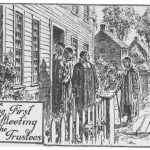Why Yale?
What makes a college work, what gives it life? Looking at contemporary Yale for clues, we might say what is needed is a sizeable endowment, an extensive physical plant, cutting-edge academic departments, a huge support staff, a colossal library, generous alumni, and, not the least, parents who are willing to pay impressive sums toward tuition. But Yale, [now over] three hundred years old, started out with none of these.
The story of fledgling Yale (see our [Fall 2000] issue) is a story of struggle against enduring obstacles: against the lack of a physical setting for the college, the lack of adequate textbooks, the lack of continuity in leadership, and a persistent lack of money. Why did Yale’s founders start the school, and what encouraged trustees and administrators—to persist in the face of looming failure and defeat?
Why Yale?
What makes a college work, what gives it life? Looking at contemporary Yale for clues, we might say what is needed is a sizeable endowment, an extensive physical plant, cutting-edge academic departments, a huge support staff, a colossal library, generous alumni, and, not the least, parents who are willing to pay impressive sums toward tuition. But Yale, [now over] three hundred years old, started out with none of these. The story of fledgling Yale (see our [Fall 2000] issue) is a story of struggle against enduring obstacles: against the lack of a physical setting for the college, the lack of adequate textbooks, the lack of continuity in leadership, and a persistent lack of money. Why did Yale’s founders start the school, and what encouraged trustees and administrators—to persist in the face of looming failure and defeat? Yale’s early documents offer a distinct and surprising answer. Here’s an excerpt from the minutes of the first Yale trustees’ meeting, held November 1, 1701:
Whereas it was the glorious publick design of our now blessed fathers in their removal from Europe into… America, both to plant, and under [the] Divine blessing to propagate in this wilderness [the] blessed, reformed, Protestant religion… not onely to their posterity, but also to [the] barbarous natives… we their unworthy posterity lamenting our past neglects of this Grand errand & sensible of our equal obligations better to prosecute [the] same end, are desirous in our generation to be serviceable therunto—where unto the liberal & religious education of suitable youth is under [the] blessing of God, a chief & most probable expedient.
The “grand errand” of the pioneers of New England was to establish truly Biblical worship of Christ in America and to offer His Gospel to the natives. Yale’s founders, who belonged to the second generation of New Englanders, saw the college as a means to that end. They knew about the losses of the last generation; that John Davenport, one of the founders of New Haven, had worked toward a college in New Haven for thirty years, only to see his efforts fail. They were dismayed that Harvard, though begun in Christ, had not continued in Him. If New England’s Gospel purpose was not to lapse in their generation, someone had to take it up. In Yale’s ten founders, God discovered men who were ready.

Yale’s founders were dismayed that Harvard, though begun in Christ, had not continued in Him. If New England’s Gospel purpose was not to lapse in their generation, someone had to take it up. In Yale’s ten founders, God discovered men who were ready.
Yale’s Charter
Yale’s original Charter (now in the Beinecke Library) seconds the trustees’ minutes when it describes the proposed “Collegiate School” as a place “wherein youth may be instructed in the Arts & Sciences who through the blessing of Almighty God may be fitted for Publick employment both in Church & civil state.” Yale was founded that successive generations of Americans might continue to be propelled by a desire to honor and serve Jesus Christ, and take His message to those who have not heard it.
The scope and frankness of Yale’s missionary purpose might astonish us because it is hard for us to imagine a college motivated by such a purpose. But it remains the case that Yale, for the better part of two centuries, held to the course marked out by her founders. All over campus, there are plaques and memorials that demonstrate Yale’s establishment in the Gospel and testify to the many Yale faculty and students who have lived for Jesus and served Him joyfully. Some of those memorialized, such as H. Tracy Pitkin (1892) and Bill Borden (1909), laid down their lives in mission fields. Any student entering Yale now has the opportunity to decide, as many others have, to live for Christ and Him alone. Anyone doing that will indeed be observing Yale’s best, and oldest, tradition.
